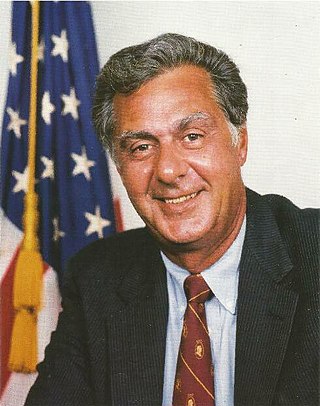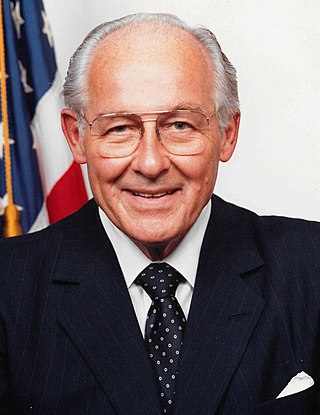
The 1996 United States presidential election was the 53rd quadrennial presidential election, held on Tuesday, November 5, 1996. Incumbent Democratic President Bill Clinton defeated former Senate Majority Leader Bob Dole, the Republican nominee, and Ross Perot, the Reform Party nominee and 1992 Independent presidential candidate.

The speaker of the United States House of Representatives, commonly known as the speaker of the House, is the presiding officer of the United States House of Representatives. The office was established in 1789 by Article I, Section II, of the U.S. Constitution. By custom and House rules, the speaker is the political and parliamentary leader of the House and is simultaneously its presiding officer, de facto leader of the body's majority party, and the institution's administrative head. Speakers also perform various other administrative and procedural functions. Given these several roles and responsibilities, the speaker usually does not personally preside over debates—that duty is instead delegated to members of the House from the majority party—nor regularly participate in floor debates.

Newton Leroy Gingrich is an American politician and author who served as the 50th speaker of the United States House of Representatives from 1995 to 1999. A member of the Republican Party, he was the U.S. representative for Georgia's 6th congressional district serving north Atlanta and nearby areas from 1979 until his resignation in 1999. In 2012, Gingrich unsuccessfully ran for the Republican nomination for president of the United States.
The "Republican Revolution", "Revolution of '94", or "Gingrich Revolution" are political slogans that refer to the Republican Party's (GOP) success in the 1994 U.S. mid-term elections, which resulted in a net gain of 54 seats in the House of Representatives, and a pick-up of eight seats in the Senate.
The Contract with America was a legislative agenda advocated by the Republican Party during the 1994 congressional election campaign. Written by Newt Gingrich and Dick Armey, and in part using text from former President Ronald Reagan's 1985 State of the Union Address, the Contract detailed the actions the Republicans promised to take if they became the majority party in the United States House of Representatives for the first time in 40 years. Many of the Contract's policy ideas originated at The Heritage Foundation, a conservative think tank.

Richard Keith Armey is an American economist and politician. He was a U.S. Representative from Texas's 26th congressional district (1985–2003) and House Majority Leader (1995–2003). He was one of the engineers of the "Republican Revolution" of the 1990s, in which Republicans were elected to majorities of both houses of Congress for the first time in four decades. Armey was one of the chief authors of the Contract with America. Armey is also an author and former economics professor. After his retirement from Congress, he has worked as a consultant, advisor, and lobbyist.

James Ralph Sasser is an American politician, diplomat, and attorney. A Democrat, Sasser served three terms as a United States senator from Tennessee from 1977 to 1995, and was Chairman of the Senate Budget Committee. From 1996 to 1999, during the Clinton Administration, he was the United States Ambassador to China.

The 1994 United States Senate elections were held November 8, 1994, with the 33 seats of Class 1 contested in regular elections. Special elections were also held to fill vacancies. The Republican Party took control of the Senate from the Democrats. Like for most other midterm elections, the opposition, this time being the Republicans, held the traditional advantage. The congressional Republicans campaigned against the early presidency of Bill Clinton, including his unsuccessful health care plan. Democrats held a 56-44 majority, after having lost a seat in Texas in a 1993 special election.

The 1996 United States Senate elections were held on November 5, with the 33 seats of Class 2 contested in regular elections. Special elections were also held to fill vacancies. They coincided with the presidential election of the same year, in which Democrat Bill Clinton was re-elected president.

Robert Henry Michel was an American Republican Party politician who was a member of the United States House of Representatives for 38 years. He represented central Illinois' 18th congressional district, and was the GOP leader in the House, serving as House Minority Leader during his last 14 years in Congress (1981–1995).

The 1994 United States House of Representatives elections were held on November 8, 1994, to elect U.S. Representatives to serve in the 104th United States Congress. They occurred in the middle of President Bill Clinton's first term. In what was known as the Republican Revolution, a 54-seat swing in membership from the Democratic Party to the Republican Party resulted in the latter gaining a majority of seats in the House of Representatives for the first time since 1952. It was also the largest seat gain for the party since 1946, and the largest for either party since 1948, and characterized a political realignment in American politics.

The 2008 United States elections were held on Tuesday, November 4, 2008, during the war on terror and the onset of the Great Recession. It was a considered a Democratic wave election, with Democratic Senator Barack Obama of Illinois defeating Senator John McCain of Arizona by a wide margin, and the Democrats bolstering their majorities in both chambers of Congress.

The United States House of Representatives is the lower chamber of the United States Congress, with the Senate being the upper chamber. Together, they comprise the national bicameral legislature of the United States. The House is charged with the passage of federal legislation, known as bills; those that are also passed by the Senate are sent to the president for signature or veto. The House's exclusive powers include initiating all revenue bills, impeaching federal officers, and electing the president if no candidate receives a majority of votes in the Electoral College.

The 1998 United States elections were held on November 3, 1998, in the middle of Democratic President Bill Clinton's second term and during impeachment proceedings against the president as a result of the Clinton–Lewinsky scandal. Though Republicans retained control of both chambers of Congress, the elections were unusual because this is the first midterm since 1934 that the president's party gained seats in the House of Representatives.

The 1994 United States Senate election in Tennessee was held November 8, 1994. Incumbent Democratic U.S. Senator Jim Sasser ran for re-election to a fourth term but was defeated by Republican nominee Bill Frist.

The 1994 United States Senate special election in Tennessee was held November 8, 1994. Incumbent Democratic Senator Al Gore resigned from the Senate following his election as Vice President of the United States in 1992, and this led to the 1993 appointment of Harlan Mathews and the subsequent special election. Mathews did not seek election to finish the unexpired term, and Representative Jim Cooper subsequently became the Democratic nominee. However, the Republican nominee Fred Thompson won the seat in a decisive victory.

The 1996 United States elections were held on November 5. Democratic President Bill Clinton won re-election, while the Republicans maintained their majorities in both houses of the United States Congress.

The 1992 United States elections elected state governors, the President of the United States, and members of the 103rd United States Congress. The election took place after the Soviet Union crumbled and the Cold War ended, as well as the redistricting that resulted from the 1990 census. Often considered "The Year Of The Woman," these elections brought an increased number of female politicians to Washington such as Dianne Feinstein (D-CA) and Carol Moseley Braun (D-IL). Governor Bill Clinton of Arkansas defeated incumbent President George H. W. Bush and businessman Ross Perot in the presidential election. The Democratic Party maintained their control of both chambers of Congress. This is the first Democratic trifecta since the Republican victory in the 1980 elections and the last one during the 20th century and the last one overall until 2008.

The 1978 United States elections were held on November 7, 1978, to elect the members of the 96th United States Congress. The election occurred in the middle of Democratic President Jimmy Carter's term. Democrats retained control of both houses of Congress.
Elections in the Southern United States are a composite or summary of elections is each of its component states.


















